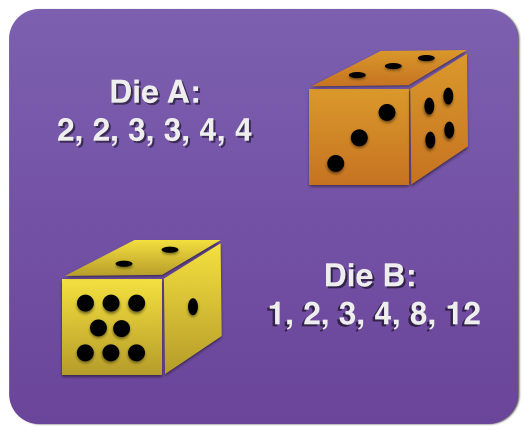Perfectly Squared Dice
 Two strange six-sided dice are numbered on each side as follows:
Two strange six-sided dice are numbered on each side as follows:
- Die A: 2, 2, 3, 3, 4, 4
- Die B: 1, 2, 3, 4, 8, 12
If one were to roll these dice at the same time and multiply the two resulting values, what is the probability that the product would be a perfect square?
This section requires Javascript.
You are seeing this because something didn't load right. We suggest you, (a) try
refreshing the page, (b) enabling javascript if it is disabled on your browser and,
finally, (c)
loading the
non-javascript version of this page
. We're sorry about the hassle.
3 solutions
Moderator note:
Good approach. For clarity, you should explain that each of these outcomes have an equal probability of occurring.
If dice A was 2, 2, 2, 3, 3, 4, how would the answer change?
Total Permutations:36 Perfect Square happens at (Dice A, Dice B): (2,2),(2,2),(2,8),(2,8),(3,3),(3,3), (3,12),(3,12),(4,1),(4,1),(4,4),(4,4) or 12 total possibilities 12/36 = 1/3 or one third of the time.
. 1 2 3 4 8 1 2 2 2 2 6 2 2 4 2 6 2 2 2 6 2 2 4 2 6 3 3 6 3 2 3 2 6 6 3 3 6 3 2 3 2 6 6 4 2 2 2 2 3 4 4 2 4 3 4 2 2 2 2 3 4 2 2 4 3
3 6 1 2 = 3 1
There are a total of 1 8 outcomes of which 6 outcomes are perfect squares (highlighted) as above. Therefore, the probability is 1 8 6 = 3 1 .